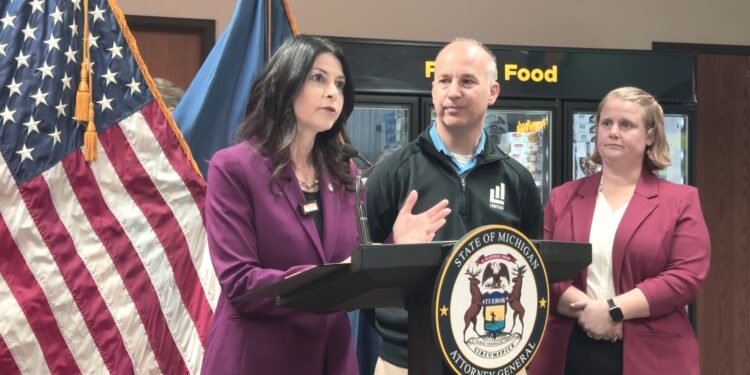LANSING, Mich. (WZMQ) – Michigan Attorney General Dana Nessel has joined a coalition of 25 states seeking a temporary restraining order (TRO) and filing a lawsuit against the U.S. Department of Agriculture (USDA) over the suspension of Supplemental Nutrition Assistance Program (SNAP) benefits.
On November 1, 42 million Americans will go without the support they need to afford food for their families. SNAP recipients will be forced to fill a $100 to $500 gap to keep their families fed.
Most people who receive these benefits are children, veterans, seniors, and disabled individuals. Numbers from the USDA show a family of four on SNAP receives around $575 a month, but they also report the overall monthly cost of groceries for that same family has risen to nearly $1,000. It’s enough to help, but not enough to cover costs completely, and enough that 1.4 million Michiganders and 42 million Americans will now go without what they need to feed their whole family in November.
“Senate Democrats have now voted 12 times to not fund the food stamp program, also known as the Supplemental Nutrition Assistance Program (SNAP). Bottom line, the well has run dry. At this time, there will be no benefits issued November 01. We are approaching an inflection point for Senate Democrats. They can continue to hold out for healthcare for illegal aliens and gender mutilation procedures or reopen the government so mothers, babies, and the most vulnerable among us can receive critical nutrition assistance.” – fns.usda.gov
Nessel said the lapse won’t just impact families, but will overwhelm food pantries and put a strain on farmers who rely on SNAP customers. Food banks across the state have said they are struggling to keep up with the number of people in need because cuts have limited donations of funds and food from federal programs. The Trump administration cut or paused nearly a billion dollars and canceled thousands of produce deliveries to the state of michigan as of August, putting a strain on food pantries’ capacity.
SNAP also supports 375,000 farmers, food distributors, and retailers, including 10,000 SNAP-approved retailers in Michigan. They receive $1.50 for every SNAP dollar they accept, meaning a lapse in SNAP could cost farmers and retailers hundreds.
Nessel pointed out the administration could use the $6 billion contingency emergency fund, or the $23 billion allocated to the USDA to use however they see fit.
She said the issue goes beyond politics. She pointed to the alert on the USDA’s website, saying it violates the Hatch Act and politicizes an issue that should not be political.
“Right now, if you visit the USDA website, you’ll be met with a shockingly political and hostile message claiming that quote the well has run dry, but that’s a lie,” Nessel said. “Let me be absolutely clear, 78%. Michigan SNAP households include someone with an earned income in every recipient must either be a U.S. citizen or have a qualified non-citizen resident status.”
Nessel said her office hasn’t received a decision on the TRO, but if granted, the federal government will be forced to pay out food stamps in at least the 26 states that filed the suit.
Still, any decision would be temporary, and without an end to the government shutdown in sight, a long-term plan will be needed to continue SNAP and other similar programs.










